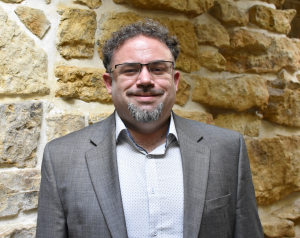Stay ahead of the curve as a political insider with deep policy analysis, daily briefings and policy-shaping tools.
Request a DemoWeekend read: 70 years ago, Georgia bucked landmark Brown v. Board of Education decision
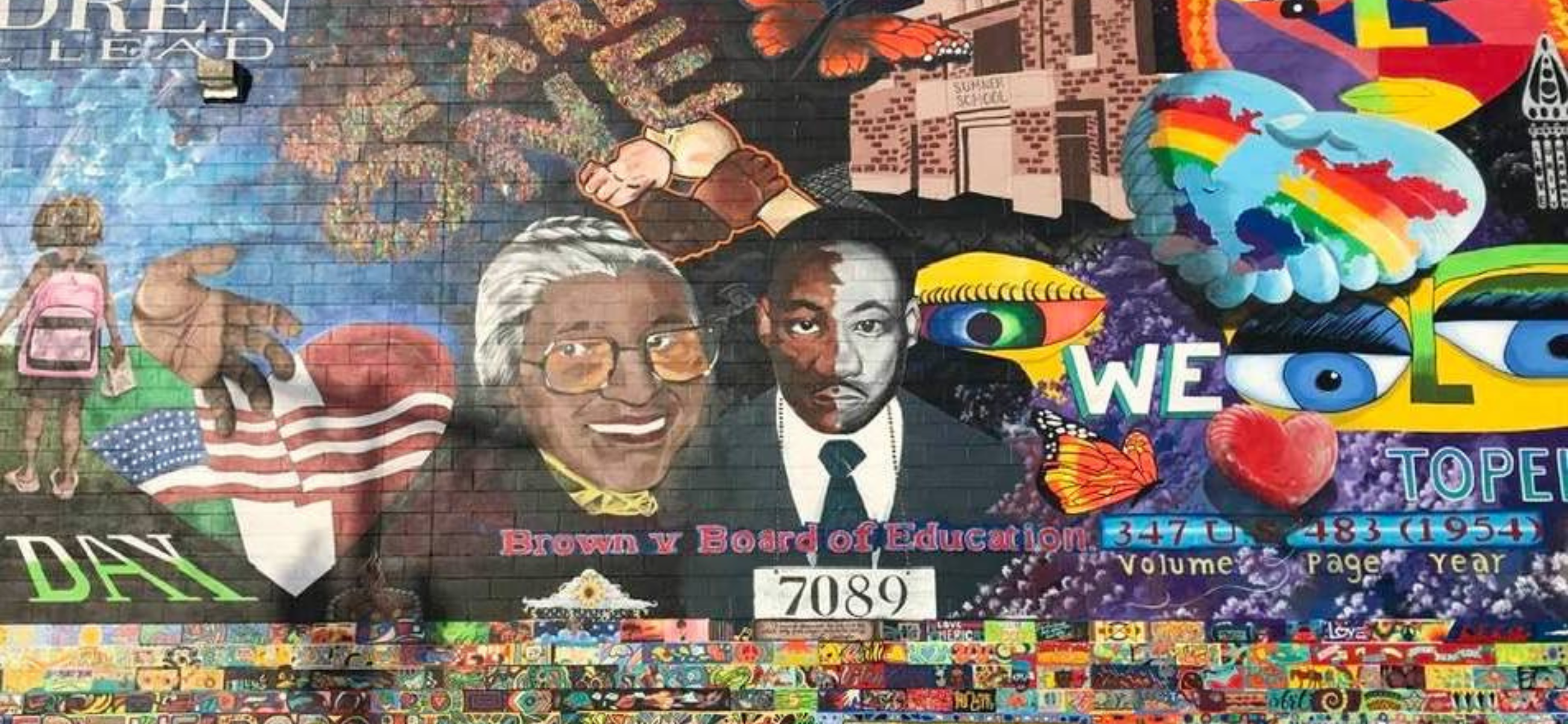
A mural located near Brown v. Board of Education National Historic Park features Martin Luther King Jr. and Rosa Parks. The sprawling 130-by-30 foot rendering was designed by a group that included dozens of artists. Equity, justice and diversity are among the mural's key themes. (Credit: Matt Resnick)
When the U.S. Supreme Court threw open the doors of public schools to Black students 70 years ago, Southern states — such as Georgia — did not go quietly when Brown v. Board of Education of Topeka became the law of the land.
“For six or seven years nothing happened. It was like it hadn’t come down,” said Charles Bullock, professor of public and international affairs at the University of Georgia.
Some states took action to desegregate schools, “but the Deep South didn’t,” Bullock said. There was “a lot of litigation,” he added. “Someone said as long as we can legislate, we can segregate. So nothing much happens until January of 1961.”
That is when a federal judge ordered the immediate admission of Hamilton Holmes and Charlayne Hunter to the University of Georgia.
“Georgians accept the challenge and will not tolerate the mixing of races,” Georgia’s then-governor, Herman Talmadge, said when the decision came down.
Talmadge went on to deride the high court, saying its “views on sociology will not make any difference.”
He wasn’t alone.
In Virginia, U.S. Sen. Harry Byrd issued a call for “massive resistance” to the Supreme Court’s decision. In Mississippi, U.S. Sen. James Eastland declared that “the South will not abide by nor obey this legislative decision by a political body.”
Brown towers as one of the most significant Supreme Court rulings in American history. Students from the era attended a 70th-anniversary event held at Burnett Administrative Center in Topeka on Thursday.
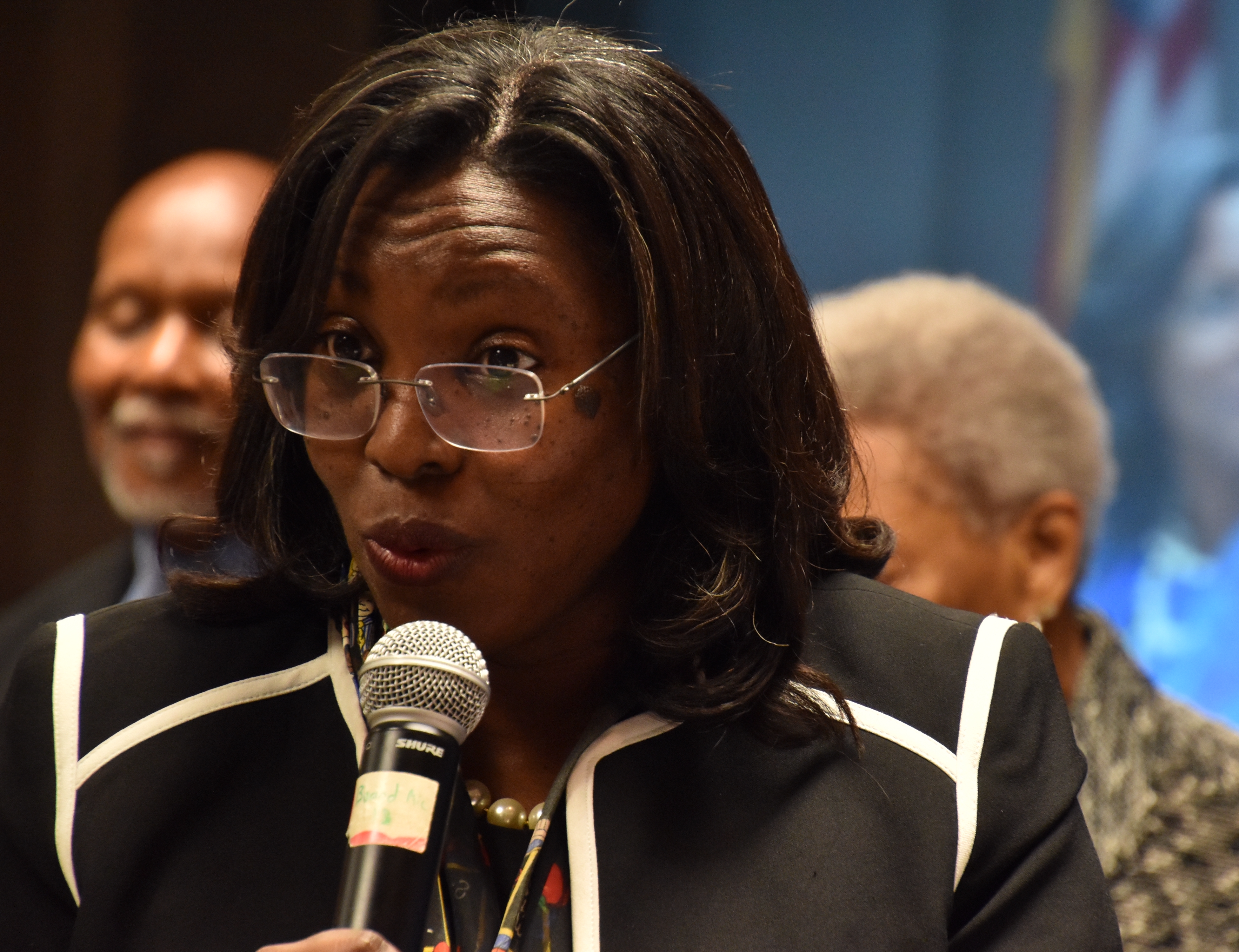
Tiffany Anderson, the first African American female superintendent hired by Topeka Public Schools, said the decision allowed for “tremendous progress” in the area of equitability simply by expanding educational opportunities.
“Whether or not you’re a parent of color or in poverty, you have access,” she said. “Those are ways to close the opportunity gaps.”
Don Perkins, though, said the district’s race relations had not evolved in a meaningful way. His children, who attended Topeka Public Schools in the 1980s, were exploited by the district for their athletic abilities, he said.
“I always smelled the chlorine but just wasn’t allowed to swim.”
He remembers his first taste of racial integration as a Black student at East Topeka Junior High.
“I got a lot of support from students, but not necessarily teachers,” said Perkins, who was elected student council president but couldn’t get any support from educators for activities.
Perkins recounted how the ruling hardly erased discrimination. For instance, Black students were barred from Topeka High’s indoor swimming pool when he attended from 1955 to 1957. “I always smelled the chlorine but just wasn’t allowed to swim,” he said.
The U.S. Supreme Court decision is rooted deep in Topeka, forever stitched in Kansas’ tapestry.
A moving mural by artist Michael Young commemorating the decision — depicting teachers, students, protesters, soldiers — can be found outside the old Supreme Court room in the Statehouse. About a mile south, a museum commemorates the case and its aftermath.
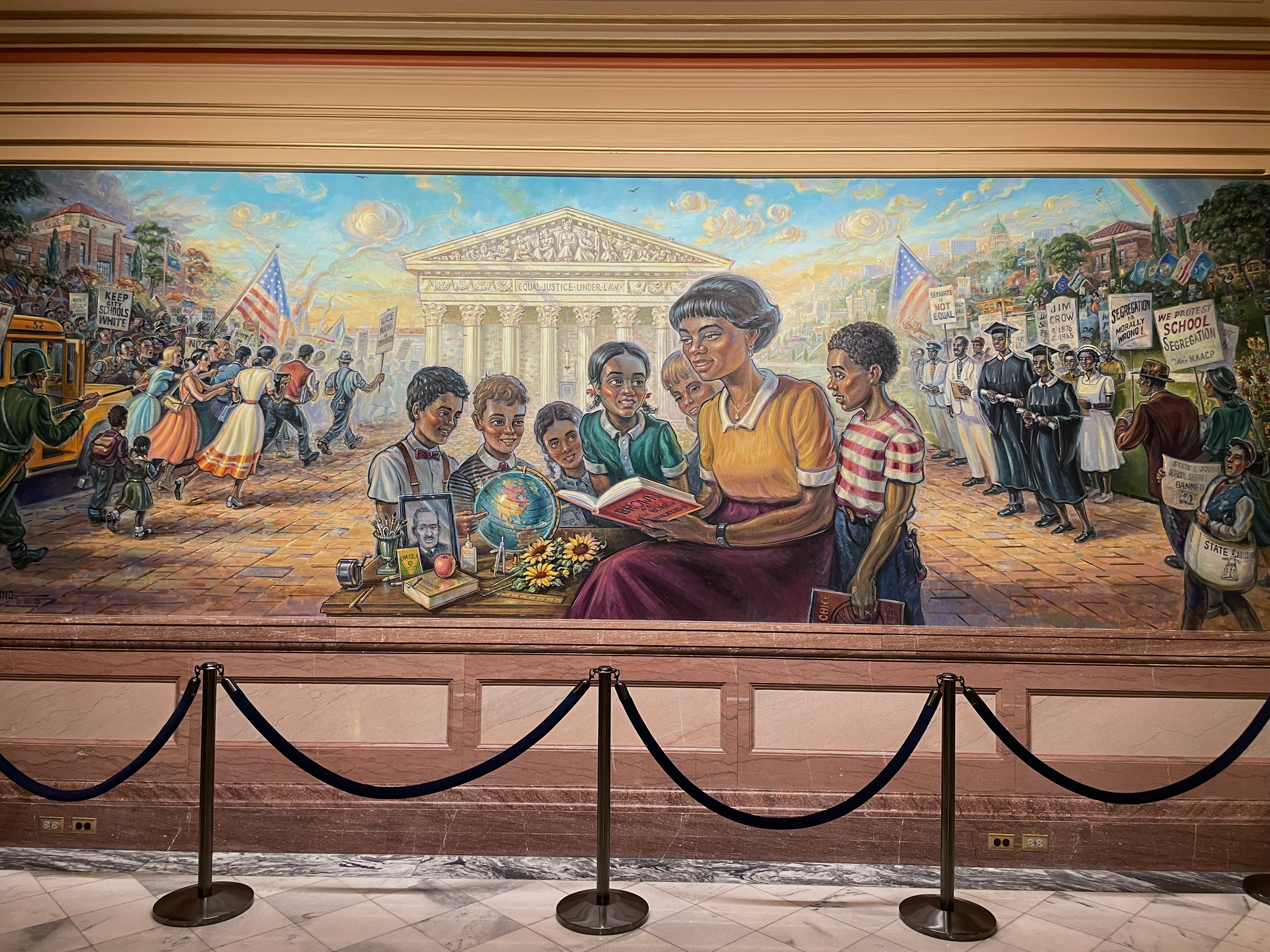
States challenging school segregation in the early 1950s included Kansas, South Carolina, Delaware and Virginia, as did Washington, D.C. The mounting litigation was bundled into a single case — Brown v. Board of Education of Topeka.
The Kansas case was filed on behalf of 13 Black Topeka parents and their school-aged children who were forced to attend segregated schools. The students would often have to walk for hours, braving the elements, when white classrooms were closer.
The court ultimately declared state-sanctioned segregation in public schools unconstitutional after concluding the plaintiffs were not allotted “equal protection of the laws guaranteed by the 14th Amendment.” “Separate but equal” was determined to be “inherently unequal.”
The decision reverberated. The high court then decided Briggs v. Elliott, finding desegregation in South Carolina was unconstitutional. Again the issue was the distance to the classrooms — some Black students walked eight miles each way to and from school after the local government refused to provide bussing.
The price of desegregation in South Carolina was steep. The petitioners in the Briggs case lost their jobs and their land. A pastor who championed the cause had his home burned to the ground. The federal judge who sided with petitioners was forced to leave the state by order of the South Carolina House of Representatives.
Pushing for change
Marquis Burnett grew up in the shadow of his late father, McKinley, a prominent Civil Rights figure. While serving as the Topeka chapter NAACP president, McKinley Burnett spearheaded the recruitment of the 13 Black families that were plaintiffs in the Brown v. Board case.
“I’m not saying the case wouldn’t have happened, but if it wasn’t for him it wouldn’t have happened when it did,” Marquis Burnett said of his father. “A lot of people think it was the Brown case, but it was actually the Topeka NAACP’s case that established integration. They’re the ones who filed the case and picked Brown [and the other plaintiffs].”
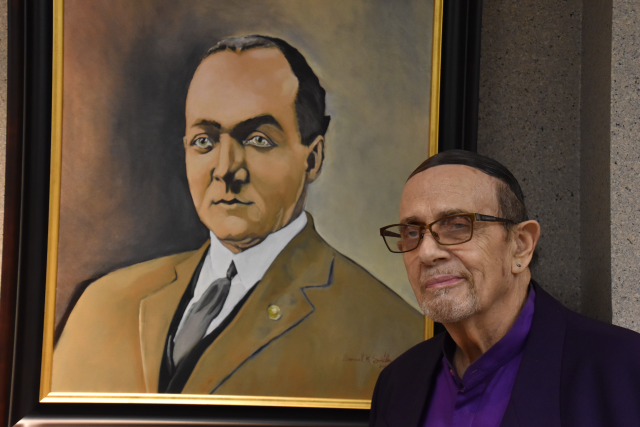

His father consistently pressed the Topeka school board for racial integration, and the board responded by drastically altering meeting times in hopes he wouldn’t show. He was also met with threats of physical violence from board members, Burnett said.
“On several occasions, board members wanted to resolve it with a fistfight,” Burnett said. “But he said, ‘No, we’ll let the courts settle it.’”
Burnett said he’s skeptical that the current conservative-leaning U.S. Supreme Court would have rendered the same verdict in the Brown ruling as its 1954 judicial counterparts.
Burnett said the Brown v. Board ruling was not necessarily viewed favorably by Black teachers at Topeka’s segregated elementary schools, who were concerned about the fate of those schools after the ruling came down.
“They thought they would lose their jobs, but that didn’t really happen because our teachers were exceptional,” he said. “We had good teachers, and that is something that should definitely be emphasized.”
Marquis Burnett planned to attend the event Thursday at Burnett Administrative Center on Thursday, a building named in honor of his father.
‘Culture of community’
Beryl New began attending Monroe Elementary in the wake of the Brown ruling. The school was eventually transformed into the Brown v. Board of Education National Historical Park.
New said teachers at Monroe embraced a “culture of community” and a “high expectation for excellence” in the classroom. As for the lasting impact of the Supreme Court’s ruling, New drew a parallel to current hotbed issues.

“This concept of ‘school choice’ has a whole different meaning today. I can choose to send my children to a private school or a public school or choose to go to the public school I want to,” she said. “Back then, there was no choice if you were a child of color in Topeka. So removing that right from tax-paying citizens was a great injustice.”
After the ruling, New said, many parents did not want to move their children to an integrated school “because of the loving atmosphere” at the segregated schools they attended.
“But if they wanted to do it, they ought to have the right to do it,” New said. “And I think that’s what the Topeka case really highlighted.”
At the time of the Brown ruling, white parents in Topeka “did not want Black teachers to teach their children,” New said.
“But many of the Black teachers who taught at the segregated schools had advanced degrees,” she said. “So you couldn’t get a higher quality of teacher, but their skin color was the issue.”
New’s “pleasant memories” of Monroe Elementary stood in stark contrast to her experience at racially integrated Topeka High School in the 1960s. New said her counselor at Topeka High bluntly told her “she wasn’t college material” and should instead enroll in secretary school.
New’s education credentials include 12 years as an English teacher, followed by several years as principal at Lawrence High School. Then, New moved to Highland Park High School, where she became the first Black female head principal in the history of Topeka Public Schools’ main three high schools.
Brown v. Board’s lasting impacts
Visiting from Charlottesville, Virginia, this week, Aleen Carey said she felt goose bumps Tuesday evening while taking in the majestic atmosphere of the former Monroe Elementary School building.
As a former educator, she said that the Brown ruling holds a deeper meaning for her — and that she taught her former students about the “Charlottesville Twelve,” which has similarities to the case.
“As a Black resident of the United States, this historical place has made such a difference in the lives of my family and every other Black person in the United States,” Carey said. “I just wanted to be able to say that I had stood here and seen it for myself. This is more important than anything else I could be doing on my visit.
“What it means to be a Black person and have the education I’ve had, you can’t put that into words what something like this means.”
It was a joyous moment for Carey, but she also remains concerned about political agendas seeking to roll back strides made during the Civil Rights Movement.

Former President George W. Bush was on hand in 2004 to commemorate the 50th anniversary of the Supreme Court ruling and the official public opening of the Brown v. Board museum.
“So even though [Bush] wasn’t my favorite president, the respect shown to say this is a very important piece of American history and to be here means something,” she said.
Carey also remains concerned about diversity, equity and inclusion (DEI) at state universities in Virginia.
Lawmakers in many states have proposed or enacted legislation aimed at rolling back DEI initiatives at public colleges and universities.
In Kansas, the GOP-controlled Legislature passed House Bill 2105 in April — prohibiting postsecondary educational institutions from using DEI practices in their admissions, educational aid and employment decisions.
Undoing the racial equity strides that followed the Brown decision is unfathomable for Carey to contemplate.
“It’s unbelievable, sad, infuriating and frustrating,” she said. And it’s really hard to think about when you’re at a place like this, knowing the courage it took to make Brown v. Board happen.”

Newsletter editor Issac Morgan contributed to this story.
Matt Resnick is a statehouse reporter for State Affairs Pro Kansas/Hawver’s Capitol Report. Reach him at [email protected].
Issac Morgan is the newsletter editor for State Affairs. You can contact him on X or at [email protected].
Professionals still face licensing delays amid state’s transition to online system
The Gist Georgia’s professionals and business owners are still struggling to obtain professional licenses in a timely manner. As the Secretary of State’s Office rolls out its new Georgia Online Application Licensing System to expedite the process, the efficiency of this new process is being put to the test. What’s Happening Thursday morning at the …
Controversy over AP African American Studies class grows
Rashad Brown has been teaching Advanced Placement African American Studies at Atlanta’s Maynard Jackson High School for three years. He’ll continue to do so — even though the state’s top education official removed it from the list of state-funded course offerings for the upcoming school year. While Brown prepares to start teaching his class on …
Students, teachers, lawmakers blast decision to end AP African American history classes
ATLANTA — A coalition of lawmakers, civil rights leaders, clergy, educators and students Wednesday called on the state’s education czar to rescind his decision to drop an advanced placement African American studies class from the state’s curriculum for the upcoming school year. “This decision is the latest attack in a long-running GOP assault on Georgia’s …
Kamala Harris’ presidential bid reinvigorates Georgia Democrats
Georgia Democrats have gained new momentum heading into the November election, propelled by President Joe Biden’s decision to bow out of his reelection bid and hand the reins to Vice President Kamala Harris. The historic decision, announced Sunday, is expected to prove pivotal in the national and state political arenas and breathe new life and …
